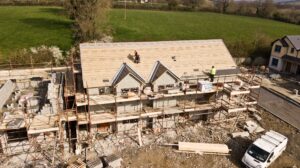
How Long Does it Take to Get a Building Permit?
Building permits are essential documents that ensure construction projects adhere to local building codes and regulations. Whether you’re renovating your home, constructing a new building, or making structural alterations, securing a building permit is a necessary step in the process. However, many individuals and businesses wonder how long it takes to obtain one. In this article, we’ll explore the factors influencing permit approval timelines, examine typical permit approval durations, discuss common delays and challenges, and suggest solutions for expediting the process.

Factors Influencing Permit Approval Timelines
The time it takes to obtain a building permit can significantly impact the overall duration of a construction project. Several factors can influence the permit approval process, including the complexity of the project, the efficiency of the local planning department, and the completeness of the permit application.
Compliance with Local Building Codes and Regulations
Building permits are essential for ensuring that construction projects adhere to local building codes and regulations. These codes are designed to safeguard public health, safety, and welfare by establishing standards for structural integrity, fire prevention, accessibility, and environmental protection. The complexity and stringency of these codes can vary depending on the jurisdiction and the type of project. For instance, projects in areas with high seismic activity or coastal zones may be subject to more stringent requirements, which can extend the permit review process.
Involvement of Multiple City Planners and Reviewers
The permit approval process often involves multiple city planners and reviewers, each responsible for assessing different aspects of the project’s design and compliance with applicable regulations. For example, a project may require review from planners specializing in zoning, fire safety, environmental protection, and accessibility. Coordinating the review of these various disciplines can add time to the process, especially if there are discrepancies or disagreements between reviewers.
Varied Capacity of Planning Departments
The efficiency of the permit approval process can vary significantly between different cities and municipalities. Smaller cities may have limited resources and staffing, leading to longer processing times. Additionally, budget cuts or staffing shortages due to economic downturns or unforeseen events can further strain the capacity of planning departments, resulting in delays in permit reviews.
Stringent Building Codes in Certain Regions
Certain regions, such as California, have particularly stringent building codes and development regulations due to specific environmental considerations. For instance, California’s strict building codes are designed to mitigate the risk of earthquakes, forest fires, and coastal erosion. These regulations, while crucial for public safety, can add complexity and time to the permit approval process as reviewers must thoroughly scrutinize plans to ensure compliance.
Application Completeness and Accuracy
Incomplete or inaccurate permit applications can cause significant delays. If an application is missing required information or contains errors, it must be returned to the applicant for corrections, extending the review period. To expedite the process, applicants should ensure that their submissions are complete, accurate, and adhere to the specific requirements outlined by the local planning department.
Funding and Staffing Issues in Planning Departments
Many local planning departments face challenges due to inadequate funding and staffing. These issues can lead to delays in processing permits as reviewers are overburdened with a high volume of applications while lacking the necessary resources to efficiently manage the workload. Adequate funding and staffing are essential for expediting the permit review process and ensuring timely project approvals.
Impact of Increased Demand During the COVID-19 Pandemic
The COVID-19 pandemic prompted a surge in demand for building permits as people spent more time at home and invested in renovations or home improvement projects. However, some planning departments were forced to reduce resources due to budget constraints or staffing issues, resulting in a backlog of permit applications. This increased demand, coupled with reduced capacity, further exacerbated the permit approval process and extended processing times.
Adoption of Online Services to Expedite the Process
In an effort to alleviate delays and streamline the permit application process, some cities have adopted online building services. This allows applicants to submit applications electronically, upload required documents, and track the progress of their review. Online services can reduce paperwork, improve communication between applicants and reviewers, and enhance overall efficiency, leading to faster permit approvals.
By understanding the factors that influence permit approval timelines, project stakeholders can take proactive measures to mitigate delays and expedite the process. This includes ensuring application completeness and accuracy, engaging experienced professionals to navigate the permitting process, and collaborating effectively with local planning departments.
Typical Permit Approval Duration
The timeline for obtaining a building permit can vary widely depending on the abovementioned factors. On average, it may take several weeks to months for a permit to be approved, but the specific duration can differ from one project to another. For example, minor permits for simple projects like roofing repairs may be approved more quickly than significant construction permits for new buildings.

Delays and Challenges in Building Permit Approval
Obtaining a building permit is an essential step in any construction project, ensuring that the proposed work complies with local building codes and regulations. However, the permit approval process can be complex and time-consuming, often leading to delays that can frustrate project timelines and increase overall costs.
Common Challenges Contributing to Permit Delays
Several factors can contribute to delays in building permit approval, including:
- Incomplete or Incorrect Applications: Inaccurate or missing information in permit applications can significantly prolong the review process. Reviewers may need to request additional documentation or clarifications, leading to back-and-forth communication and extended timelines.
- Understaffed Planning Departments: Planning departments often face staffing shortages, particularly in smaller municipalities or during periods of economic downturn. With limited personnel to handle the volume of permit applications, delays become inevitable.
- Complexity of Building Codes and Regulations: Building codes and regulations can be intricate and vary depending on the jurisdiction and the type of project. Reviewers must thoroughly scrutinize plans to ensure compliance with these standards, which can be time-consuming.
- Changing Project Requirements: If a project’s scope or design changes after the initial permit application, it may require additional review and potential resubmissions, further extending the approval process.
- Review Conflicts: In some cases, disagreements or discrepancies between different reviewers may arise, requiring further discussions and resolutions, leading to delays in final approval.
Impact of COVID-19 Pandemic
The COVID-19 pandemic exacerbated these challenges, creating an unprecedented backlog of permit applications. As people spent more time at home during lockdowns and restrictions, demand for home improvements and renovations surged. However, planning departments were often understaffed and faced budget cuts, limiting their ability to process the influx of applications.
Case Study: San Jose, California
In San Jose, California, the impact of the pandemic was particularly evident. During the early months, permits for new construction decreased by 50% and permits for additions or remodels dropped by 85%. This sharp decline in permit processing highlights the strain placed on planning departments and the resulting delays faced by applicants.
Strategies for Mitigating Delays
To mitigate delays and expedite the permit approval process, project stakeholders can consider the following strategies:
- Thorough Preparation and Completeness: Ensure that permit applications are complete, accurate, and adhere to the specific requirements outlined by the local planning department. This includes providing all necessary documentation and clearly outlining the project scope and design.
- Experienced Professional Guidance: Consider engaging experienced professionals, such as architects or engineers, to assist in the permit application process. Their expertise can help ensure that applications are complete, accurate, and compliant with local regulations.
- Open Communication with Planning Departments: Maintain open communication with local planning departments. Regular check-ins can provide updates on the review process and help identify any potential issues that may require attention.
- Consider Online Permitting Systems: Utilize online permit submission systems, where available, to streamline the application process and track its progress.
- Seek Clarification on Complex Requirements: Don’t hesitate to seek clarification from planning departments if there are any uncertainties regarding specific requirements or regulations. This proactive approach can prevent delays caused by misunderstandings or errors.
By understanding the factors contributing to permit delays and implementing these strategies, project stakeholders can take proactive measures to expedite the approval process and minimize project disruptions.
Addressing Permit Approval Challenges: Implementing Effective Solutions
Recognizing the significant impact of permit approval delays on construction projects and overall economic growth, cities and municipalities are actively exploring and implementing strategies to address these challenges and expedite the permit approval process. These efforts aim to enhance efficiency, reduce wait times, and foster a more streamlined and supportive regulatory environment for construction projects.
Streamlining Online Services: Embracing Digital Efficiency
The adoption of online building services has emerged as a key strategy for streamlining the permit approval process. Online applications allow applicants to submit their requests electronically, upload required documents, and track the progress of their review, eliminating the need for physical paperwork and in-person visits. This digital approach not only enhances convenience for applicants but also improves efficiency for planning departments, reducing administrative burdens and enabling them to focus on technical reviews.
Advocating for Increased Funding: Investing in Planning Capacity
Adequate funding for planning departments is essential for ensuring timely and efficient permit processing. Staffing shortages and limited resources often hinder planning departments’ ability to handle the volume of applications, leading to backlogs and delays. By allocating more funds to these departments, cities can increase staffing levels, provide training for existing staff, and implement technology solutions that enhance productivity. Additionally, adequate funding allows planning departments to adopt innovative approaches, such as pre-application consultations and expedited review processes, to further expedite permit approvals.
Enhancing Coordination: Fostering Collaboration and Transparency
Improving communication and collaboration among city planners and reviewers can significantly reduce delays caused by multiple reviews. By establishing clear protocols for interdepartmental communication and establishing dedicated teams for complex projects, cities can streamline the review process and ensure that all necessary approvals are obtained in a timely manner. Additionally, promoting transparency throughout the process, by providing applicants with clear timelines, status updates, and contact information for reviewers, can foster trust and reduce frustration.
Exploring Alternative Approaches: Piloting New Models
Cities are also exploring alternative approaches to permit approval, such as performance-based codes and prefabricated construction, to further reduce timelines and enhance efficiency. Performance-based codes focus on achieving specific performance outcomes rather than prescribing specific construction methods, providing greater flexibility and potentially reducing review times. Prefabricated construction, where building components are manufactured off-site and assembled on-site, can streamline construction processes and reduce the need for extensive on-site reviews, potentially expediting permit approvals.
Empowering Applicants: Providing Education and Resources
Providing applicants with comprehensive education and resources can help reduce delays caused by incomplete or inaccurate applications. Cities can develop online guides, offer workshops, and provide dedicated support staff to assist applicants in understanding permit requirements, preparing submissions, and navigating the process effectively. Empowering applicants with knowledge and support can minimize errors and expedite the review process.
By implementing these strategies and continuously evaluating their effectiveness, cities can create a more efficient and supportive regulatory environment for construction projects, fostering economic growth and enhancing the overall development process.
Conclusion
A building permit is a necessary but sometimes time-consuming step in the construction or renovation. The duration of the approval process can vary widely depending on several factors, including local regulations, staffing, application completeness, and demand. While challenges and delays can be frustrating, efforts to streamline online services, increase funding, and improve coordination among planning departments are ongoing to expedite permit approvals and make the process more efficient for applicants.

Jason Somers, President & Founder of Crest Real Estate
With over 15 years of professional experience in the Los Angeles luxury real estate market, Jason Somers has the background, judgement and track record to provide an unparalleled level of real estate services. His widespread knowledge helps clients identify and acquire income producing properties and value-ad development opportunities.
Learn more about Jason Somers or contact us.



